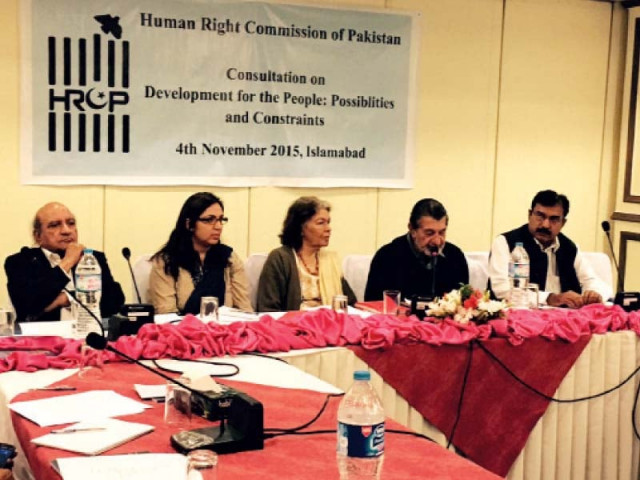Workers’ rights: Rights activists for pro-people development
Panellists say health, education should not be privatised

The consultation, attended by trade union members, human rights activists, members of prominent political parties and media officials, discussed concerns of trade unions pertaining to privatisation. PHOTO: EXPRESS
This was the consensus of human rights activists at a consultation titled ‘Development for People: Possibilities and Constraints,’ hosted by the Human Right Commission of Pakistan (HRCP) on Wednesday.
“Development is not just providing food, shelter and clothes to people; the real meaning of a nation’s development is the intellectualisation of its people; their education, enhancing their thinking abilities and professional progress,” said HRCP Secretary General IA Rehman.
The consultation, attended by trade union members, human rights activists, members of prominent political parties and media persons, discussed concerns of trade unions pertaining to privatisation.
“Privatisation is just a way for the government to get rid of its responsibilities. It does not help the end consumer and devastates the trade union,” said All Pakistan Workers Confederation (APWC) General Secretary Khurshid Ahmad.
Pakistan Workers Federation (PWF) chief organiser Mukhtar Awan said when a trade union is eliminated, human rights are violated.
“Without a trade union, there is no regulation on minimum wages, working conditions, workers’ rights and a large number of workers are made jobless in the name of downsizing or rightsizing,” he said.
Speaking on taxation, renowned economist Dr Syed Akbar Zaidi said successive governments have tended to approach the International Monetary Fund (IMF) for loans, whereas if taxation is conducted appropriately, the country does not need loans.
“Only 900,000 Pakistanis pay income tax, which is the reason the country has to rely on IMF loans,” he said, adding that, “Imposing taxes on trivial things like text messages and services is not the way forward.”
The consultation also said that the two sectors that should not be privatised are health and education, as these are the responsibility of government.
“If there is inequality in education, there will always be inequality in the system,” said economist Parvaiz Tahir.
Dr Aasim Sajjad Akhtar, Awami Workers Party’s Punjab president, said military run organisations should be held accountable for the amount of capital invested into them, as opposed to their returns. He also said the youth needs to be educated about politics.
“This country has a majority of people under the age of 35, therefore there is a dire need to ensure that the youth is aware of politics and the problems of society,” he said.
Senator Afrasiab Khattak, provincial president of Awami National Party, highlighted the need for making the government accountable for basic human rights.
“As many as 1,000 ANP members were killed last year and none of their murderers were caught,” he said, stressing the need for providing rights to people and holding the government accountable.
Published in The Express Tribune, November 5th, 2015.



















COMMENTS
Comments are moderated and generally will be posted if they are on-topic and not abusive.
For more information, please see our Comments FAQ